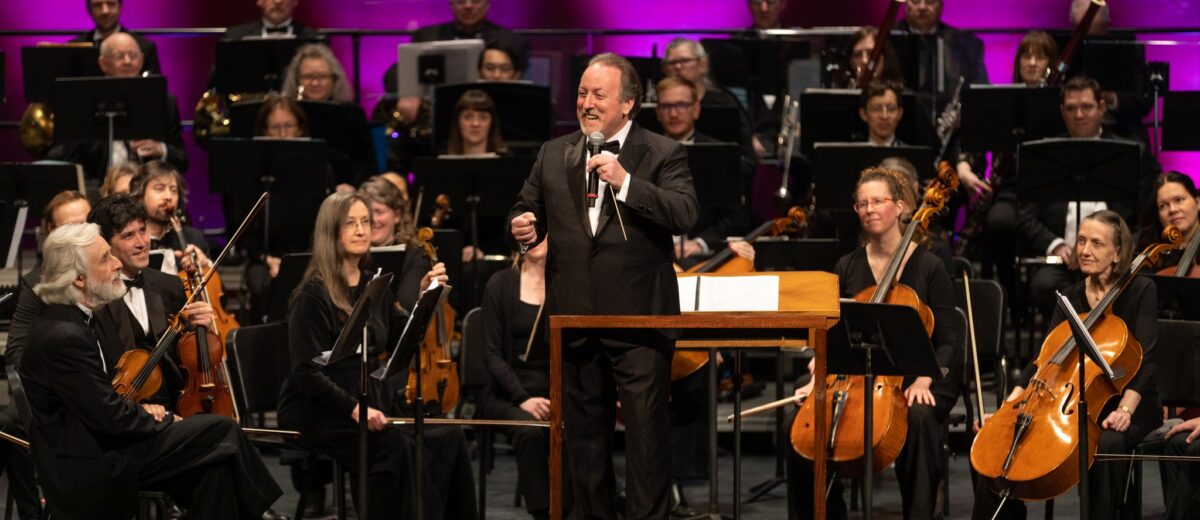Judy Harrison, Bangor Daily News, May 1, 2024
 The Bangor Symphony Orchestra threw its conductor and music director, Lucas Richman, one heck of a 60th birthday party Sunday at the University of Maine’s Collins Center for the Arts. Every note the musicians played in the “Paths to Dignity” program was composed by Richman.
The Bangor Symphony Orchestra threw its conductor and music director, Lucas Richman, one heck of a 60th birthday party Sunday at the University of Maine’s Collins Center for the Arts. Every note the musicians played in the “Paths to Dignity” program was composed by Richman.
The concert concluded the orchestra’s 128th season and extended the maestro’s birthday celebration far past his January birthdate. The audience members rose to their feet and roared with admiration and applause.
The centerpiece of the program was “Concerto for Violin: Paths to Dignity,” written for Mitchell Newman, the orchestra’s new concertmaster, who was Sunday’s soloist. Newman and Richman founded the Paths to Dignity Program to weave “homeless advocacy with music to inspire, to educate, to bring hope and to rekindle dignity.”
Richman said in the program notes that the concerto “reflects upon the lives affected by homelessness by translating to music the stories of unsheltered individuals and the community’s moral responsibility to those individuals.” The piece is divided into four parts: Our Stories, Fever Dreams/Move, Shelter for My Child and Finding Home.
It is a searing piece that layers the music from each section of the orchestra on top of the next to create a tapestry full of chaos and tranquility in equal measure. One its most unusual elements is a metal trash can in the percussion section played like a drum. Newman played with passion and compassion bringing to life the struggles faced by Bangor’s homeless residents.
Richman wasn’t the only one honored Sunday. Retired lawyer and longtime symphony board member Berney Kubetz was recognized in the opening six-minute piece by Richman entitled “Y’varechecha,” known as the “Priestly Blessing” or “Aaronic Blessing,” from the Torah. It was commissioned by Kubetz’s wife, Cindy, for his 75th birthday.
Because a chorus was needed for “Symphony: This Will Be Our Reply,” Richman wrote a choral section for the piece with text from Numbers 6:24-26 sung in Hebrew and English.
In introducing the work, Richman told the audience that Kubetz, who for many years represented the Bangor Daily News, used to say the blessing – “May the Lord bless you and keep you. May the Lord shine his face toward you and be gracious unto you. May the Lord lift his countenance upon you. And give you peace” — to his sons when they were young.
“Y’varechcha” was a fitting and welcome way to open this concert, and that blessing, beautifully sung by what seemed like a wall of voices, rolled over the musicians and across the audience like a warm embrace.
The concert concluded with “Symphony: This Will Be Our Reply,” written in celebration of the Leonard Bernstein Centenary in 2018. Richman worked with Bernstein, who died in 1990, during the last decade of the maestro’s life.
The piece is based on a statement Bernstein made in 1963 shortly after the assisination of President John F. Kennedy. “This will be our reply to violence: to make music more intensely, more beautifully, more devotedly than ever before,” he said.
Based on that, Richman composed three movements: Intensity, Beauty and Devotion. The piece “expand(s) upon these three directives, exploring the contrasts of great beauty and horrific violence that pervade our modern era,” Richman said in the program notes. It includes a choral section, sung by the University of Maine singers and the Oratorio Society and directed by Francis John Vogt, that is a poem, “Tikkun Olam,” by Richman, which translates to “heal the world.”
It is a stunning accomplishment that was a fitting companion piece to the concerto. The symphony too echoes the violence in our modern world and the role that music and the arts play in healing individual human beings and society as a whole. Its conclusion was a clarion call for concertgoers to devote themselves to that process in ways large and small.
BSO announced its 129th season, titled “An Illumination of Sound,” on Sunday. It will include five Masterworks concerts with works by Beethoven, Brahms, Mozart, Tchaikovsky and Shostakovich. The orchestra will continue its tradition of playing “The Nutcracker” for the Robinson Ballet in December and will bring back a movie-themed concert in May titled “Star Wars — A New Hope,” the first film in the franchise, originally released in 1977.

